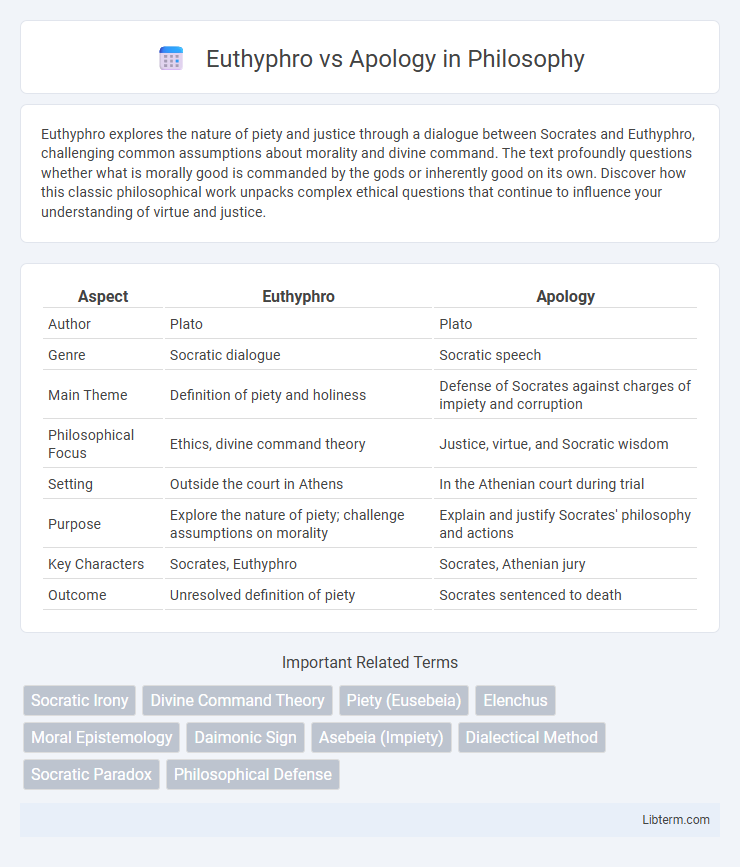Euthyphro explores the nature of piety and justice through a dialogue between Socrates and Euthyphro, challenging common assumptions about morality and divine command. The text profoundly questions whether what is morally good is commanded by the gods or inherently good on its own. Discover how this classic philosophical work unpacks complex ethical questions that continue to influence your understanding of virtue and justice.
Table of Comparison
| Aspect | Euthyphro | Apology |
|---|---|---|
| Author | Plato | Plato |
| Genre | Socratic dialogue | Socratic speech |
| Main Theme | Definition of piety and holiness | Defense of Socrates against charges of impiety and corruption |
| Philosophical Focus | Ethics, divine command theory | Justice, virtue, and Socratic wisdom |
| Setting | Outside the court in Athens | In the Athenian court during trial |
| Purpose | Explore the nature of piety; challenge assumptions on morality | Explain and justify Socrates' philosophy and actions |
| Key Characters | Socrates, Euthyphro | Socrates, Athenian jury |
| Outcome | Unresolved definition of piety | Socrates sentenced to death |
Introduction to Euthyphro and Apology
Euthyphro presents a dialogue where Socrates encounters Euthyphro outside the court, exploring the nature of piety and justice amid impending legal charges against Socrates. Apology documents Socrates' self-defense speech during his trial in Athens, emphasizing his commitment to philosophy and questioning conventional wisdom. Both texts, authored by Plato, offer foundational insights into Socratic philosophy and the ethical dilemmas surrounding law and morality in ancient Greece.
Historical and Philosophical Context
Euthyphro and Apology, two of Plato's early dialogues, explore foundational themes in ancient Greek philosophy and justice during Socrates' trial in 399 BCE. Euthyphro delves into the nature of piety amid Athenian religious practices, illustrating the conflict between conventional religious norms and philosophical inquiry. Apology presents Socrates' defense against charges of impiety and corrupting youth, highlighting his commitment to ethics and dialectical reasoning in the sociopolitical climate of classical Athens.
Main Characters: Socrates and Euthyphro
Socrates, the central figure in both "Euthyphro" and "Apology," is portrayed as a relentless seeker of truth, using dialectical questioning to challenge assumptions and reveal deeper philosophical insights. Euthyphro, in the dialogue named after him, embodies religious confidence, attempting to define piety yet failing under Socratic scrutiny, highlighting the complexities of divine morality. In "Apology," Socrates defends his philosophic mission against accusations of impiety and corruption, emphasizing reason and ethical inquiry as essential to a virtuous life.
Core Themes in Euthyphro
Euthyphro centers on the nature of piety and divine justice, exploring whether actions are pious because the gods love them or the gods love them because they are pious, highlighting a fundamental ethical dilemma. The dialogue probes definitions of holiness, challenging Socrates' interlocutor to clarify moral concepts through rigorous questioning. Core themes include the relationship between religion and morality, the quest for absolute knowledge, and the limits of human understanding in defining ethical principles.
Core Themes in Apology
The core themes in Plato's Apology revolve around Socrates' commitment to truth and justice despite facing charges of corrupting youth and impiety. The dialogue emphasizes Socratic irony, the pursuit of wisdom through questioning, and the philosopher's duty to challenge societal norms. Socrates asserts the importance of moral integrity over public opinion, showcasing his fearless defense of philosophy and the examined life.
The Concept of Piety: Analysis and Debate
The dialogue in Euthyphro explores the concept of piety through Socratic questioning, challenging the notion that piety is simply what is loved by the gods, thus raising questions about the nature of divine approval and morality. In contrast, Apology shifts focus to Socrates' defense against charges of impiety, where piety is indirectly examined through his commitment to rational inquiry and ethical integrity rather than blind religious adherence. The debate between these texts highlights the tension between traditional religious definitions of piety and a philosophical understanding based on reason and justice.
Socratic Method in Both Dialogues
Socrates employs the Socratic Method in both Euthyphro and Apology to challenge assumptions and stimulate critical thinking through relentless questioning. In Euthyphro, this technique exposes contradictions in Euthyphro's definition of piety, highlighting the complexity of moral concepts. In Apology, Socrates uses the method to defend his philosophy and actions, demonstrating intellectual rigor and commitment to truth despite legal accusations.
Differences in Philosophical Focus
Euthyphro centers on the nature of piety and the challenge of defining moral concepts through Socratic questioning, highlighting ethical inquiry as its primary philosophical focus. Apology, by contrast, emphasizes Socrates' defense of his life and philosophy, exploring themes of justice, virtue, and the role of the philosopher in society. These distinct focuses reveal Euthyphro's pursuit of abstract ethical definitions and Apology's engagement with practical implications of living a virtuous life under societal scrutiny.
Ethical Implications of Euthyphro vs Apology
Euthyphro explores the ethical relationship between piety and morality, questioning whether moral acts are inherently good or deemed so by divine command, highlighting the complexity of ethical foundations. In contrast, Apology emphasizes Socratic ethics centered on the pursuit of virtue and the examined life as essential for moral integrity and justice. Both texts challenge conventional beliefs, encouraging critical reflection on ethical principles and the role of reason in moral decision-making.
Lasting Impact and Contemporary Relevance
Euthyphro and Apology showcase Socratic dialogue's influence on Western philosophy, emphasizing ethics and justice concepts that shape legal and moral discourse today. Both texts challenge readers to critically examine assumptions about piety and virtue, fostering ongoing debates in contemporary philosophy, law, and theology. Their enduring relevance lies in provoking reflection on personal integrity and the foundations of societal norms.
Euthyphro Infographic

 libterm.com
libterm.com